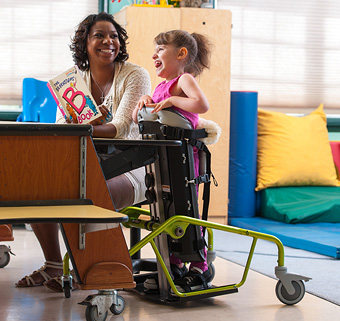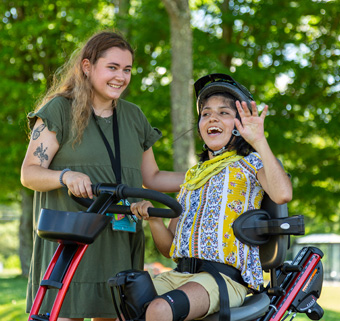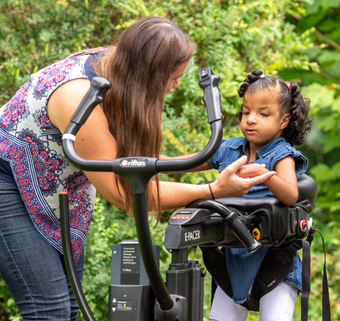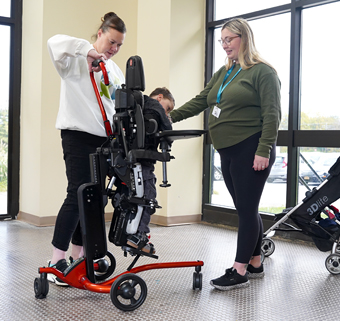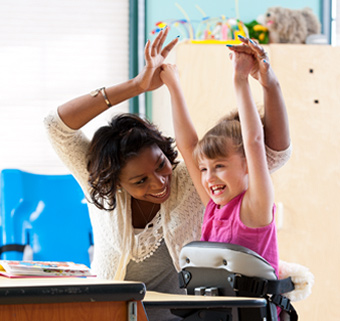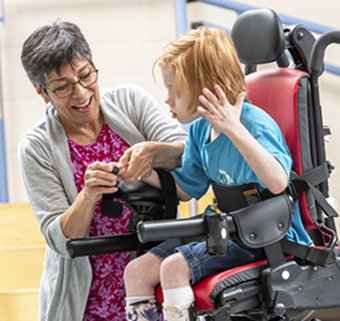APT KENYA – Changing Lives with Postural Management
| April 2023 For a child with multiple disabilities, postural management improves quality of life. Thoughtful positioning throughout the day in upright and seated postures benefits a child’s function and participation, skeletal alignment and strength, energy levels, bowel and bladder functioning and breathing capability. Postural management interventions rely on the use of external supports to functionally and appropriately position a child who cannot otherwise independently stand, sit or walk. As a pediatric physiotherapist doing some voluntary work for a charity in Kenya, involving training local therapists about postural management and crafting seats and standing frames from recycled paper and cardboard, I would like to share the beauty and success of this postural management initiative.
For a child with multiple disabilities, postural management improves quality of life. Thoughtful positioning throughout the day in upright and seated postures benefits a child’s function and participation, skeletal alignment and strength, energy levels, bowel and bladder functioning and breathing capability. Postural management interventions rely on the use of external supports to functionally and appropriately position a child who cannot otherwise independently stand, sit or walk. As a pediatric physiotherapist doing some voluntary work for a charity in Kenya, involving training local therapists about postural management and crafting seats and standing frames from recycled paper and cardboard, I would like to share the beauty and success of this postural management initiative.
Children with Disabilities in Kenya
An estimated 114,500 children are born with cerebral palsy in Kenya each year, and 70% of those children live in poverty. Nearly half of these will be unable to sit or stand unsupported and will spend their time lying inside on the floor or on a mattress. For the poorest parents, having equipment that can help position their child or even getting therapy for their child is just a dream. With no money to travel to clinics or hospitals, they feel alone and overwhelmed by their situation. Few parents have had the diagnosis explained and so do not know how best to care for their child, which means children are left lying in the same asymmetrical position all day, on the floor or a bed, with no stimulation and unable to move. Without good postural management, children often develop painful and fixed contractures such as hip dislocations, limb contractures and spinal deformities. They are trapped in their homes and cannot participate in family or community activities. Ignored by those around them, stepped over or forgotten, they have an isolated and often painful existence.
The APT KENYA Project
The APT KENYA project started in February 2022 in Njoro, Nakuru County, in response to the needs of these children. APT, or Appropriate Paper-based Technology, is a sustainable solution using readily available, cheap and recyclable waste cardboard, newspaper, and flour-based paste to make chairs and standing frames for postural support. In the workshop run by the Potters House CBO, layers of cardboard are glued together using a flour and water paste and covered with multiple layers of paper before being painted and decorated. All materials are locally sourced, and the Potter’s House CBO employs parents from the families that the charity works with, giving them an income to help feed their families and pay school fees.
This equipment enables children to sit or stand up and engage in family life for the first time. Families and neighbors are starting to see the children’s potential, and other children bring toys and play with them on their trays. Some children have started to communicate, making sounds after years of silence. Others have been able to hold a cup for the first time, feed themselves and even draw pictures. Still others can now attend school thanks to appropriate classroom chairs. The project is changing lives and helping to break down the barriers and stigma people living with disabilities in Kenya face.
Since specialized pediatric training for therapists in Kenya is limited, I also provide training for local therapists as part of the project. This serves to strengthen the skills of local therapists in diagnosis, treatment, and prescription of adaptive equipment for children. These therapists then work alongside APT workshop staff who fabricate the custom chairs and standing frames, to produce affordable assistive devices for the children with disabilities in their communities.
The project also benefits the local community economically and employs three local APT workshop staff full-time to make the equipment, and therapists to measure and prescribe devices and adaptations. A tailor is employed to make the cushions, straps and harnesses, and the less skilled work of papering and painting is offered to parents from families living in poverty, enabling them to earn sufficient income to maintain their families whilst seeking alternative, long-term employment. In its first year, the project built and delivered over 100 items to Kenyan children with severe disabilities, directly improving their quality of life. From qualitative interviews in a study we conducted regarding the efficacy of these seats and standing frames, we found that APT improved the functional ability of children, improved their participation in daily life and reduced the burden of care on the family (Barton, 2022).
But perhaps the families of the children say it best:
QUOTES FROM CAREGIVERS
“Many thought he can’t go to school, but by the help of the device he is now in school. It has changed some people’s mindset.”
“By children coming around her while in the device and playing together, I can note she is trying to pronounce some words.”
“I’m happy to see my child being able to have time with other family members and not being in the same position the whole day.”
“Him being in the sitting position has changed some people’s perception that he will never do anything.”
“Since he is able to see the people around and even follow with his eyes, he tries making noises as a way of communicating.”
“The lying position looked as if it was final, now whenever people meet him sitting it is a way of telling them, this child is just like any other human being.”
“It has helped him play with others.”
Support APT KENYA
To find out more about the project and ways you can help APT KENYA continue to transform children’s lives, go to our website: https://www.thepottershousecbo.com/apt and follow us on Facebook: https://www.facebook.com/APTinKenya.









Reference
Barton C, Buckley J, Samia P, Williams F, Taylor SR, Lindoewood R. The efficacy of appropriate paper-based technology for Kenyan children with cerebral palsy. Disabil Rehabil Assist Technol. 2022;17(8):927-37. DOI: 10.1080/17483107.2020.1830442 DOI: 10.1080/17483107.2020.1830442
